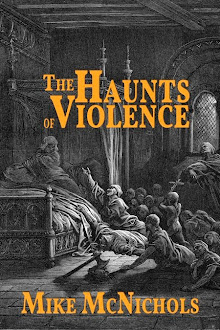THE WHORE
By Mike McNichols
He stared at her arm as she poured the coffee. The colors were vibrant and fresh, cascading from shoulder to fingertip in a swirl of manic design. He half expected the rainbow of ink to leak through to his cup, but the coffee retained its dark brown identity, just as he believed that God intended.
She moved away from his table and he watched her, not lasciviously, but rather with fascination. Her entire body—at least what he could see in arms, legs, and midriff—appeared to be an artist’s palette, ending at ankles and neck, saving face, feet and palms for some future burst of creativity.
She waltzed gracefully from table to table, pouring coffee and asking about orders and satisfaction with the food. The occupants of each booth watched her just as he did, smiling and wincing as she moved away, whispering their evaluations of her skin and the character beneath it. Much of the conversation in the room seemed to focus on the woman’s painted body.
Having no one with whom to speak, he sat alone and watched her. She was young—maybe mid-twenties—with dark blond hair that was bundled and pinned at the back of her head with a carelessness that suggested detachment from the world of respectable fashion. Her body was slim and appreciable to the eye, her face pretty in a natural way; it was likely that little of her waitress’s income was spent on makeup. He was glad that her body art did not extend to her face. He liked her face and hoped it would continue to be ink free.
•
“That girl is a whore.” The woman hissed her accusation to her friend as soon as the waitress was out of earshot. “Just look at the tattoo on her back—look right now, Audrey! She’s pouring coffee for that man over there! I’ll bet the tattoo artist got an eyeful when he put that monstrosity on her. Another inch and you can see . . .”
Audrey looked back at her friend and widened her eyes, signaling her to stop talking. “She’s coming back this way. Shhhh!”
The waitress passed by their table, smiling as she observed their full coffee cups. “Your food should be right up, ladies,” she smiled.
Thank you,” the two women purred in unison. They were silent until the waitress disappeared into the kitchen.
“I read the other day that you can get AIDS from tattoo needles,” said Audrey. “Do you think she has AIDS, Joanie?”
Joanie sniffed. “I don’t know and I don’t want to know. She’s so young and it’s just a shame what these people are doing these days. They think they look so sexy with those tattoos and it’s all about that, you know. They’d put tattoo spiders on their faces if they thought they could get some slimy boy to have sex with them.”
“They’re just sluts,” said Audrey.
“Sluts,” agreed Joanie, sipping at her coffee. “Where’s our food? It’ll be lunchtime before we get breakfast.”
“Joanie—do you think we should eat it? What if she’s—infected?”
Joanie considered the possibility, and then shook her head. “No, she’s not the cook. If she were the cook, we’d never come here again. You can’t get AIDS from someone carrying a plate.”
“What if she spits in our food?”
“Just don’t make eye contact with her, Audrey. Don’t make her mad at us. People with tattoos are really angry people.”
•
He left a tip on the table and walked up to the register to pay his bill. The waitress passed by him, her purse over her shoulder, and exited out the front door of the café. Apparently her shift was over. As the door closed, two young men followed after her, having left their payment for their meals on the table. The café manager emerged from the kitchen and approached the register.
“Was everything okay, Father?” The manager offered up a half smile.
“Hmm? Oh, yes. Everything was fine.”
“The collar’s a dead giveaway. No disrespect intended.”
The priest smiled. “None taken. It comes with the uniform.”
He paid the bill and stepped outside. In the parking lot, the waitress was attempting to unlock her car door as her short skirt revealed an ample amount of leg. The two young men who had followed her out were now flanking her, and their smiles did not appear to be friendly. The waitress did not appear to be flattered by their inquiries.
The priest walked casually to the trio and stopped just a few feet away.
“Hello, friends. Beautiful morning, isn’t it?”
The leering smiles left the faces of the men and they glared at the priest. The waitress turned, her face expressing relief.
The priest turned his attention to the waitress. “Can I help you with anything?”
“No, I’m okay. I just need to get going.”
“Hey,” said one of the men, “don’t be in such a hurry. We just want to talk.”
“Just leave me alone,” said the waitress. “I really don’t want to talk to you.”
“Sure you do,” said the other man. “You’ll love us once you get to know us.”
The priest took a step closer. “I think you heard what she said, gentlemen. She wants you to leave her alone. I would advise you to respect her wishes.”
“Piss off, priest,” said the first man. “This is none of your business.”
“Actually,” said the priest, “this is a big part of my business.”
The second man stepped up and leaned into the priest’s face. “Maybe you’re in over your head here. Don’t think your dog collar will protect you.”
“Are you threatening me, young man?” The priest smiled innocently.
“I’m not afraid to kick your ass, pal.”
The priest took on a pensive look. “I wonder what would be more embarrassing for you: To have to tell your friends that the two of you beat the crap out of a priest who is twice your age, or that a middle-aged priest beat both of you senseless.”
The second man laughed. “Right. Like you could take us.”
The priest straightened his posture, his thick chest expanding against his black coat. “I wasn’t born a priest, my friends. That came later for me, after my days as a Navy Seal.”
“Bullshit,” said the first man. “You weren’t no Seal.”
“We could find out,” said the priest. “Maybe I’ll even show you my Seal tattoo.”
“You’re lying,” said the second man.
“Maybe,” said the priest. “And maybe not. Why don’t we find out?” The priest’s calm, soft demeanor changed suddenly, his blue eyes turning to ice and his face losing all expression. He unfolded his hands and let them drop to his side. He widened his stance by a few inches.
The first man stepped back, his expression now conveying uncertainty. He looked at his friend, and then at the waitress.
“Come on, Billy. She’s not worth it.” He turned and started walking away. The second man hesitated, glaring at the priest and then at the waitress.
“You can have her, man. Look at her—she’ll go with anybody.” He spit on the ground and wiped his chin on his sleeve. Both climbed into a pickup truck and pulled out of the parking space. The priest watched as they drove away.
“I’m sorry about this,” he said.
“That’s okay,” said the waitress. “Thanks for stepping in. I’ve seen those guys before. They’re real creeps.”
“Keep an eye open. They might come back.”
“I will,” she said. “They think because I have all this . . .” She held up one multicolored arm. “That I’m easy. I hate that.”
“I understand,” said the priest. “People make assumptions about me all the time because of this.” He pointed to his clerical collar.
“Yeah,” she said, “I guess so.” She looked quizzically at him. “So were you really a Navy Seal?”
“Yes, I was.”
“And you really have a tattoo?”
“I do,” he said, pointing to his right shoulder. “Here.”
“So you really could beat the crap out of those guys.”
“Well, probably not.” He smiled sheepishly. “It’s true I was a Seal, and I did, in my youthful enthusiasm and in a less-than-sober state, get tattooed. But I blew out both my knees in a training exercise before I ever saw any action. I’m better with books now than I am with fighting. They probably would have thrashed me.”
“Wow,” she said. “Good bluff. Thanks for taking the risk.”
“You’re welcome,” he said. “By the way, my name’s Jeff.” He extended his hand, and she took it.
“Hi . . . Jeff. I’m Annie.”
“Nice to meet you, Annie. Be careful now. I’ll see you some other time.” He turned to walk to his car, but stopped when she called after him.
“I’m not that way, you know.”
He looked back and returned, walking closer to her. “What way?”
“The way those guys think. And the way a lot of people think. I’m not a whore.”
“I believe you, Annie.”
“That’s not why I have tattoos.”
Her tank top and short skirt revealed limbs that sported all manner of figures and words, colors and shapes. The priest shifted uncomfortably, trying not to look at her legs too closely.
“Can you tell me why you have them?”
She leaned against the car and set her purse on the roof. “My skin is the only story I have.”
“What do you mean?”
She took a deep breath. “My dad was killed in a car wreck when I was really little. I don’t even remember him. It was only my mom and me growing up—no other kids, no grandparents, no relatives at all. We were alone, but we had each other.”
“It sounds like she was a good mother.”
Annie shrugged. “She did what she could, I guess. She died of cancer when I was thirteen. After that, it was a whole series of foster homes.”
“I’m sorry, Annie. That must have been very difficult.”
“I got used to it. No one ever hurt me or anything, but I never felt like I belonged anywhere to or anybody. I didn’t know my own family history and I didn’t have any relatives in the whole world who could tell me what story I belonged to. When I moved out on my own, I realized that if I died, I would just disappear like I never existed in the first place. It freaked me out, the loneliness was so bad.”
The priest looked at her arms and shoulders, the drawings of ocean waves, faces, and names cascading across her skin. “So your skin is telling your story.”
She looked down at her feet, moving a piece of gravel with the toe of her sandal. “Yes. I am my story. I’m the only record of my dad and mom and what little life we had together. My skin reminds me that I’m living a real life and that I’m a real person. When you’re completely alone, you start to lose a sense of yourself if you don’t have a way to remember who you are and where you came from.”
They stood quietly for a moment. The priest spoke softly.
“Thank you for telling me this, Annie. I’m honored that you would include me in . . . your story.”
She smiled. “It’s the least I could do, after you almost got the crap beat out of you.” They both laughed. “Maybe I’ll include you in my permanent record.”
The priest chuckled at the thought, wondering where his image might find a place on her already-crowded body.
“I hope we can talk again sometime, Annie. I hope that in sharing this with me that you don’t feel as alone as you did before.”
“Yeah, maybe I don’t. We’ll see.” She retrieved her purse and opened the car door. “Bye, Jeff.”
“Goodbye, Annie.” He walked to his car, climbed in, and started the engine. He watched in the rearview mirror as Annie drove away. He reached over and rubbed his right shoulder as though it ached.
He suddenly felt very glad that he had his tattoo.






































